- Home
- Sam Siciliano
The Web Weaver Page 18
The Web Weaver Read online
Page 18
Holmes sat back in his chair and placed the tips of his fingers together. “I know who the gypsy was.”
Henry leaned forward. “You do!”
Holmes smiled sadly. “Yes. It is rather obvious. Do you recall that the letters were signed with an A? The A stands for Azucena.”
Henry and I stared at him. “Sherlock, what do you mean?” I could not keep the annoyance from my voice. “Azucena was the character in the opera. She is not a real person.”
“Oh, I am quite aware of that, as was the person who played the gypsy. However, Azucena was the model for her character. I suspected some such scheme, but the realization struck me as a certainty in the second act. The gypsy at the ball was described as being almost exactly the same, her costume identical.”
“You are only guessing!”
“I do not guess, Michelle.” His voice was cold, but then he smiled and shrugged. “I rarely guess. I am absolutely certain Azucena was the inspiration for the gypsy and her curse. ‘Mi vendica,’ remember? ‘Avenge me.’ This is more of the strange humor as with the cake and the spiders. Signing the letters with an A is some person’s idea of a clever joke.”
“It is not my idea of a joke—it is hardly funny.”
He stared innocently at me. “You think not?”
“No. Is this just a game to you?”
Henry took my arm. “Michelle...”
“It is no game to me! Violet is my friend, and she is so sad and sick—oh, Sherlock, you must help her. I beg of you—the strain is tearing her apart.”
“She is a strong woman,” Henry said.
“You would not say so if you had seen her two nights ago! She is strong, yes, but so much of it is an act. I am worried to death about her. Please, Sherlock.”
He had grown very pale. He ran his long fingers through his black, oily hair, and then set his hand on the table. “I shall do everything I can to save her, Michelle. Believe me, I would...” His fingers touched his glass, caressed it briefly, then circled the rim. “One way or another, she is in grave peril.”
“One way or another—what do you mean?”
He sipped his whiskey and soda. “La diritta via era smarrita. I promise, I shall save her.” He obviously meant what he said, but I had never heard such quiet desperation in his voice.
Nine
We had seen Il Trovatore on Wednesday evening. Saturday morning I went to Baker Street. Although I arrived at eleven, my cousin was only then confronting a boiled egg perched upright upon its holder. His dark brows sank inward, a smile flickered over his lips. He struck the egg sharply with his spoon, cracking it nearly in half. “Ah, Henry. Do sit down. Are you hungry?”
“I have already eaten.”
“A shame. Mrs. Hudson is very good with a boiled egg. Four minutes and thirty seconds exactly. Overcook them, and they are a dry abomination. Undercook them, and they are repulsively gelatinous.”
Mrs. Hudson gave me one of her long-suffering smiles. “Coffee, Doctor?”
“Please.”
She poured a cup from the china pot, and I sat at the small table. Sherlock had removed the upper half of the eggshell and set it upon a saucer. Carefully, he spooned out some egg, leaving the top concave so the yolk would not run out.
He was so meticulous an eater I could not imagine when or how it had happened, but on the cuff of his purple dressing gown was what appeared to be prehistoric, dried egg yolk. Although I knew that he changed his linen every day and that he would discard a coat or trousers at the first sign of wear, the old woolen gown appeared decrepit. This one slovenly garment was the exception that proved the rule. No doubt it was like a familiar, comfortable old friend.
“I am glad you did not come yesterday, Henry. I was in a foul mood. Rarely have I been so frustrated. However, I have resolved anew to use those brains, those unique talents, which God has given me. I have been behaving... I have not been myself.”
“This affair of the Wheelwrights is very dark. It has disturbed Michelle greatly, and I too feel uneasy.”
Holmes had eaten the upper, uncovered half of the egg; now he carefully scooped some from the half shell remaining. “Very dark indeed. Michelle has a kind and generous heart. It does her credit, but I cannot—must not—let my sympathies cloud my reason.”
I took a sip of coffee and smiled. “Reason and the heart are often at odds.”
He took the last bit of egg from the shell. He chewed briefly, dabbed at his lips with a napkin and threw it aside. “I must be true to my nature, or I am lost. I am too old to change.”
“Are you? It hardly seems that way. It seems as if you are changing and that fact disturbs you.”
He sat back in his chair and extended his long arms before him, his gray eyes fixed on me. Abruptly he rose, strode to the fire, then stood with his back to me, his left hand clutching the wrist of his right arm. He was still for only seconds, then whirled about.
“You are very perceptive, Henry. All the same, reason—this brain—” he placed his forefinger on his temple— “has been my guide through the labyrinth of life. I must trust it still. The heart will only... leave me wallowing in the mire.”
I laughed. “What a frightful metaphor! It is clear where your sympathies lie.”
He returned to the chair and crossed his legs, revealing a bare bony ankle between the leather slipper and the black wool of his trousers. “Is it? Do you also presume I am some mechanical automaton incapable of genuine human feelings?” His eyes were hot and fierce.
“You know me better than that—I have never presumed any such thing. Quite the contrary.”
He took a quick sip of coffee. “Forgive me. I do know that. All the same, it is my reason I must now follow and not my heart.”
“Why divide yourself?”
“Because my heart might misdirect me—because it might make me betray everything I have ever believed in, everything I have fought for.”
“How could it do that?”
He stared at me, and then lowered his eyes. “If you do not understand... that is good. Perhaps...” Briefly his gaze lost its focus as his thoughts turned inward; at last he seemed again to see me. “The lady in question is a married woman. How, therefore, can I trust my heart?” Despite his smile, his eyes were pained.
I stared at my cup and toyed with the spoon. “Perhaps there might be... some way.”
Holmes laughed, a harsh, sharp sound. “Do you think if there was any real hope that I would not...?” He paused, his Adam’s apple bobbing as he swallowed. “No, Henry. Even were I lacking in moral scruples—even if I did not respect the lady so much... Over the years, in my profession, I have encountered too many sordid and disgusting cases involving married men or women and a third person. The guiding force—despite protestations of great love—was rarely the heart, but another portion of the anatomy. I could never lower myself—or dream of lowering a lady—to the level of some vulgar, clandestine affair.”
“I was not proposing any such thing! I only... Perhaps she could... obtain a divorce.”
“On what grounds? Adultery in the male will not suffice. And Father Wheelwright would never tolerate such a scandal. Very bad for the potted meat business.” Holmes shook his head. “Besides, this is all extremely presumptuous on our part. The lady may not share...”
“She is interested,” I said. “Very interested.”
Holmes started to speak, then hesitated. “Do you believe so?”
I laughed. “I may not have your powers of observation, but in this case I am certain.”
A furtive smile pulled briefly at his lips, but he shook his head. “No matter, Henry. Futile reveries will not assist me now; mere feelings must not distract me. I must rely on my mental powers, as I have for all these years. There is a problem to be solved—many problems. This business with the Wheelwrights is only one part of a larger puzzle, the most complicated I have ever encountered.”
“What puzzle is this?”
He scratched his bare ankle with his fing
er, then, abruptly, was up and pacing again. “You know about the theft of George Herbert’s necklace. I have spoken with Lestrade, and some other acquaintances, at Scotland Yard. Crime is difficult to quantify, but they think they have been busier. Several thefts, as in the case of Herbert, were very skillfully done—not the work of crude, sloppy burglars or cracksmen. You know how Lord Harrington was blackmailed. I have had another member of the nobility approach me—a prostitute is threatening him with ruin. Lestrade has heard similar tales, and he suspects some high-class procurer is systematically putting the squeeze on his clientele. Other curious things have happened. The coal baron, Michael Welsley, died a week ago and left his entire fortune to a miners’ hospital. It will be contested, but the nurse and a patient at the hospital witnessed him signing a letter requesting the change. And then there is the recent madness of Lord Wilson.”
“Is he not known for his violent temper?”
“Yes. He has apparently been hearing voices, threatening voices. They keep him awake. They torment him. He is under his wife’s care, but he may soon be sent to an institution in the country. Oh—so far all these unfortunates seem to have attended the Paupers’ Ball.”
I felt the dread squarely in my chest. “Good Lord.”
“Hardly surprising, Henry. Everyone was at the ball.”
“Do you think the gypsy...? Some evil presence seems at work in all of this.”
He gave a fierce nod. “Yes—some evil human presence. One need not posit evil spirits or devils. Men are sufficiently wicked. I have encountered men who would outmatch any devil from hell. The gypsy is a fake—I am certain—but the evil is real enough. I believe a single person is behind this epidemic of crime.”
Again I felt afraid. “Your Moriarty?” My voice was very soft.
Holmes gave me a wan, weary smile. “Yes. Whoever this person may be. And his ‘Angels.’”
“And is he also behind the threat to Mrs. Wheelwright?”
“I believe so, but I have so few facts.” He shook his head and sat again, drumming at the table with his long fingers. “My instincts tell me it is all related, all part of a vast pattern—a great web. Blast it! Watson’s feeble metaphor would be the first that comes to mind! Some puppeteer is pulling all the strings. However, what I most need now are facts. I have several leads, which must be pursued. I have pondered idly long enough—I am ready for action.”
“I hope these other crimes will not distract you from the Wheelwrights.”
“They will not. I shall not rest until I discover the truth about the Wheelwrights.” He stood up again. “I have several ideas, some of which are not... I need more information about the Lovejoys. I mistrust them both, especially the wife.”
“Why?”
“Her hysteria is too convenient. She plays the part of a devout Christian, yet when I ask her what church she attends, she cannot tell me. I press the matter, and down she goes. When I returned to the Herberts’, I questioned the servants and discovered Mrs. Lovejoy seems to have been more than just a casual acquaintance of Mrs. Dalton.”
“I do not like that. But the husband seems a decent fellow.”
“Perhaps a trifle too decent. He is like the perfect butler in some play. Oh, I have less to go on than with the wife, but I suspect him all the same. The fact they come from Liverpool bothers me.”
“How can they possibly help that?”
“Again, it is too convenient. They have no past I can examine, no former employers whom I can question. Even their Liverpool employer is accommodatingly deceased. However, there is another person whom I wish to meet, a rather obvious suspect.”
I pulled at the corner of my mustache, frowning. “Who?”
“Come, come, Henry. You must know.”
I gave him a blank stare.
“Consider how Mr. Wheelwright spends his afternoons.”
I sat upright, and then stood. “The mistress!”
“Yes. She has an excellent motive for wishing Violet harm.”
“Of course! She must be the person.”
Holmes laughed, then took off his dressing gown and threw it over a chair. “You have never met the woman, and yet you appear certain of her guilt. Many men have mistresses, but most mistresses do not plot against their benefactors’ wives.” He took a pair of black stockings from his desk drawer (I could see the gray blur atop the desk which was the web of his resident spider), and sat down on the sofa, raising one bare foot. “Would you like to meet her?”
“What? You are going to confront her?”
“No. I merely wish to meet the lady. You really must join me.”
“When Wheelwright finds out, he will be furious.”
“He will not find out.”
A gentle rap sounded at the door, then it swung partly open revealing Mrs. Hudson. “Lord Harrington is here to see you, Mr. Holmes.”
“Harrington? Why the devil would he choose now of...? Give me two minutes, Mrs. Hudson, then you may admit him.” Holmes was wearing black trousers and a white shirt without the collar buttoned on. He snatched the dressing gown and retreated to his bedroom. From there he said, “As soon as we are finished with Lord Harrington we shall pay a call upon Miss Alice Ladell. I must confess to a certain curiosity.”
He strode back into the room, collar done up, black cravat in place, his frock coat folded over one arm, his boots in hand. He put on the coat, tugged at the lapels, then flipped it back before he sat and pulled on a boot. By the time Mrs. Hudson opened the door, he was on his feet and looking as if he had been dressed for hours.
“Good day, Mr. Holmes.” Lord Harrington gave Mrs. Hudson his stick, pulled off his gray gloves and put them in his top hat, then handed her the hat. He had not a hair on the dome of his head, but his beard and the hair in back were thick, curly and red. His large, light blue eyes had a wary look. He noticed me and struggled to recall my name. “Dr. Verner, is it not?”
“Vernier,” I said, shaking his hand.
Holmes gestured at a chair. “Please sit down, Lord Harrington.”
He sat before the fire and rubbed his hands together. His fingers were long and white; his hands oddly delicate for so large, broad shouldered a man. “It’s beastly cold and wet.”
Holmes nodded, then sat, watching him closely. Harrington gazed at the glowing coals. “I suppose frankness would be best. I’d as soon get it off my chest at once. Mr. Holmes, when you showed me that dreadful letter of my brother’s, I told you I had no idea who the scoundrel was, the villain Joseph blamed for ruining him. I must confess I was being less than truthful.”
Holmes stroked his chin with his forefinger. “I suspected as much.”
“As well you might. The devil’s name, Mr. Holmes, is Steerford. Geoffrey Steerford.”
Holmes frowned, closing his eyes and putting his fingertips on his temple. “Steerford. I know that name.” He stood up. “Something to do with investments? I heard the name at a party.”
Harrington gave a reluctant nod.
“But there is something else. Steerford. Steer... Ah, Flora Morris, who gave us the suicide note, said the name crossed out had been Turnford—only a slip of the tongue away. This is very useful information, Lord Harrington. I am in your debt.”
“I hope you can use it to save others from that blackguard.”
“I certainly shall. What made you come to me?”
Lord Harrington had set his elbows upon his knees, leaning toward the fire. He gazed up at Holmes, then his eyes fell. “I did not want to come. My family name has been dragged through the mud because of this wretched business. Before you gave me that note, I had half convinced myself my brother had been murdered. Now it is clear that he was a very... disturbed man.”
“I am sorry,” Holmes said, “to have been the one to discover the note, but I thought...”
“You thought, quite rightly, that I should have it. After all, he was my brother. After some soul-searching, I have also showed it to Harriet, Joseph’s wife. The truth, dreadful as it is
, is...” He looked up again at Holmes. “He tried to tell me, some six months ago, about his torment, but I was repelled by the little he revealed, disgusted. Had I heard him out...”
“You cannot blame yourself for his death.”
“No? If he had had a sympathetic ear to share his troubles...”
Holmes’ mouth was taut, grim. “It may have been closer to murder than you think. Someone knew his weaknesses only too well. His mistress, that pathetic child, did not come up with such a scheme.”
I repressed a shudder. “It was that vile old monster, her ‘aunt’.”
Holmes folded his arms. “I shall want to meet this Mr. Steerford.”
Harrington’s jaw slid briefly forward, anger showing in his pale blue eyes. “I have not yet told you why I have come. I had thought of visiting you for the past week but always found some excuse for delay. However, yesterday I received a letter from Mr. Steerford, polite in tone, but most threatening. He apparently knows of your interest in my brother’s death, Mr. Holmes, and he said all of London, including the newspapers, would discover more about Joseph’s vices should I assist your investigations.” His face had reddened, his voice hoarsened. “I’ll not let the blackmailing dog who destroyed my brother threaten me. Regrettably, I cannot kill him with my bare hands, but I shall do all I can to bring ruin down upon his head.” He drew in his breath, struggling to calm himself. His eyes were fixed on Holmes. “If I can be of any assistance, Mr. Holmes, I hope you will call upon me. Should you require additional funds...”
“You have already paid me generously, Lord Harrington.”
“If you need money—or anything else—let me know, and you shall have it. I want this man brought to justice. I do not want him to destroy anyone else, as he has destroyed Joseph. He thought he could coerce me into silence—he thought I would put my pride as a Harrington above all else. Well, I do not wish to see Joseph’s name further soiled, but I could not live with myself were I to sit idly by while other poor wretches and their families suffered. I shall see the villain in hell first.” His voice shook, and his eyes were deadly earnest.

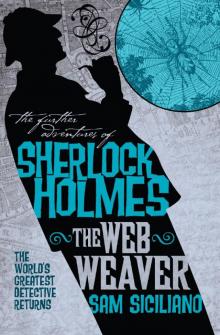 The Web Weaver
The Web Weaver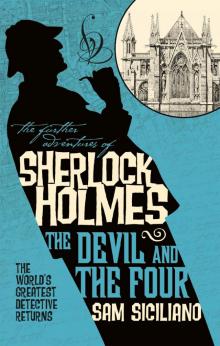 The Further Adventures of Sherlock Holmes--The Devil and the Four
The Further Adventures of Sherlock Holmes--The Devil and the Four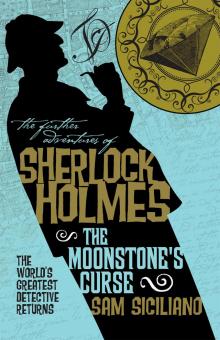 The Moonstone's Curse
The Moonstone's Curse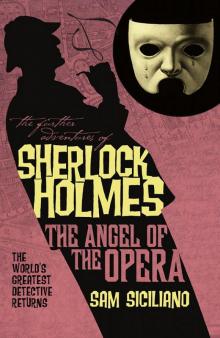 The Angel of the Opera
The Angel of the Opera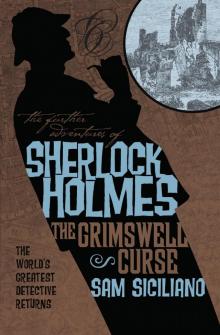 The Grimswell Curse
The Grimswell Curse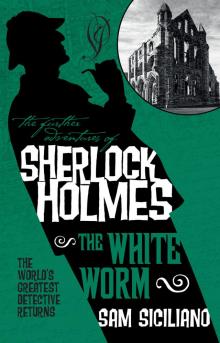 The White Worm
The White Worm